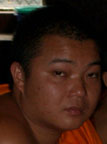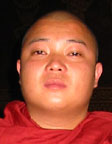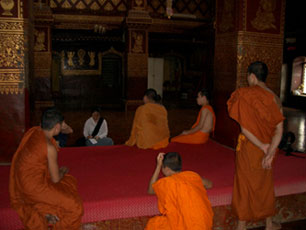“Tell Me More About Buddhism”
Jonathan’s interview with Dhu Saam, an Abbot

We observed that the Tai Khun temple was bigger and more ornate on the interior than other Thai temples we’d seen. In this temple there was one big Buddha that was in the center surrounded by twelve smaller Buddhas. Just then, Dhu Saam, introduced as the abbot, entered. During the interview, a number of novices and young monks came in and out of the room to listen to the conversation.
JONATHAN: Is the Tai Khun (Shan) Temple different from the Tai Long?
DHU SAAM: They are the same. The Tai Long, Thai, and Burmese temples are all quite different because they come from different roots. The platform [where the monks sit], for example, would be in front of the Buddha in a Burmese temple.
JONATHAN: Is there a reason why?
DHU SAAM: In the Tai Khun temple, everyone is supposed to pay respect to Buddha first, then to the monk. In a Burmese temple, everyone pays respect to the Buddha and monks at the same time. Because in Buddhism the order of importance is: the Buddha image, the Buddhist Scripture, then the monk, so [the Tai Khun] temple follows this order. There is only one Buddha, but we [Burmese, Tai Khun, and Thai] view the images differently, so that’s why there are many different kinds of Buddha images.
JONATHAN: When people pay respect to the Buddha image, who are they praying to?
DHU SAAM: When people come, they pray to Buddha. The prayer depends on the person. Young people pray for lottery numbers. Older people pray for merit, to be reborn as a person and get good merit to go to Nirvana.
JONATHAN: So when they pray, who answers their prayers if Buddha is in a state of nothingness, according to our understanding of Nirvana?
DHU SAAM: (Hesitating…) We don’t have to answer the question because Buddha gave the Scriptures so we have the answer. When Buddha was on this earth, he taught everywhere and he taught everyone to do good things. Everyone who followed his teaching would go to <Niphan>, or Nirvana. But all those who can’t follow his teachings are still on this earth. So now Buddha is in Heaven but we are on Earth because in our past life we couldn’t follow his teaching so on this Earth we need to state our desire to go to Nirvana.
JONATHAN: Why would we want to go to Nirvana?
DHU SAAM: In Nirvana there is nothing. Only spirits can enter Nirvana.
JONATHAN: Is that appealing, to live in a state of nothingness? Why would anyone want to go to Nirvana if there’s no joy, no personal relationships? It seems in Burma, people enjoy being in relationships but in Nirvana there are no relationships.
DHU SAAM: We can’t focus too much on Nirvana because when people come to the temple they focus on three happinesses: 1. Life on this earth, 2. Life in Heaven, and 3. Life in Nirvana. If you make enough merit, you go to Heaven. If you come back on this earth, it means you have to make more merit. If you make a lot of merit, you go to Nirvana. The reason that all people want to go to nirvana is because on this earth all they have is suffering, rich or poor, with work and with family. In nirvana, they don’t have to worry about these things.
JONATHAN: Don’t you want more than that?
DHU SAAM: There’s nothing beyond nirvana. Actually I do want [more] but we’ve been taught there is nothing beyond nirvana.
JONATHAN: In Christianity, there is a Creator God who wants to have a personal relationship with his people.
DHU SAAM: But our teaching is different. Buddhism teaches that in the beginning was Buddhist Scripture, then Buddha, and Buddha tries to follow the Buddhist Scriptures, and then there are monks. (The monks inform us it’s time for their lunch.) If you really want to learn more about Buddhism, there’s a Sri Lankan monk at another temple who speaks good English.
“Tell me more about Christianity”
A second interview with Dhu Saam led by Andy

The next day we were back at the same Temple hoping to find out more, when it began raining. It was pouring too hard to return to the hotel at the time. We saw Dhu Saam again and he invited us back to the same room we were in yesterday until the rain subsided. He was accompanied by several novices. When we were seated, Dhu Saam asked us to share about Jesus Christ. But he also wanted to share with us about Buddha. (At first it seemed that he was asking because of spiritual interest, but towards the end of the conversation it seemed more for the benefit of being able to talk to visiting foreigners more clearly. However, it was clear that he was eager to talk to us. He even remarked that he would skip lunch to talk to us. We said that we would also skip lunch to talk to him. After approximately an hour and a half, he asked some novices to bring us hot cereal and bread.]
DHU SAAM: Buddha was born on earth. Does Jesus have a father?
ANDY: We believe Jesus’ is the creator God.
DHU SAAM: Does he have a mother?
ANDY: He doesn’t have a mother. He was born on earth to save us from sins. [Andy thought it best not to confuse him yet in discussing the Virgin Mary.] Can we talk about the difference between Buddhism and Christianity and go from there?

DHU SAAM: Yes.
ANDY: Can I tell you the story about Jesus?
ANDY: We believe in God the Father.
DHU SAAM: What’s his name?
ANDY: Creator God, and that Jesus is the son of God. And we believe in the Holy Spirit.
DHU SAAM: How many brothers and sisters did he have?
ANDY: Jesus has no brothers and sisters because he is God, and God has no brothers and sisters because he is God, and God has no brothers and sisters. We believe in only one God.
DHU SAAM: Who was Jesus’ mother?
ANDY: Jesus didn’t have a mother, but he was born on earth by Mary. [Our translator explained further until Dhu Saam reiterated his understanding of what we were saying, that God sent His spirit that enabled Jesus to be born on earth by Mary.] [The way the conversation was going was frustrating, especially to Andy because Dhu Saam was trying to ask questions in a list format and not allowing us to simply tell the story of Jesus. Dhu Saam wanted the gospel in list form because that is how the Dharma is expounded in Buddhism].
DHU SAAM: When Jesus was born, did he just become God? Or did he grow up as a human?
ANDY: He was God before he became a human being and in order to save us he became born as a human being.
DHU SAAM: Does he have only one name? [Buddha had different names before and after he became the Buddha.]
>ANDY: Jesus is not like the Buddha. He only had one life. [Andy then went on to share with him from Phil. 2:P6-11.]
DHU SAAM: When was Jesus born?
ANDY: 2000 years ago. Christians believe God created the world. He created the world without suffering. But man, even though there was no suffering decided to go against God. So man brought suffering into the world when he sinned against God. Ever since then, there’s been suffering. So because God loved us so much, he sent Jesus into the world to save the world from suffering.
[Dhu Saam shared with the translator that his knowledge of Jesus was limited to knowing Jesus was nailed to the cross. He went to church once to learn more about Christianity, but when he tried asking some church members his questions, they told him he should ask someone who was more educated about Christian matters.]
DHU SAAM: So you don’t have to make merit? You just have to believe in your heart? Because we don’t know whether we have 30mg or 15mg of merit.
ANDY: Humans can’t fix the problem, only God can fix the problem. You have to trust Jesus for your merit. You can’t trust yourself.
DHU SAAM: So it’s okay if I kill someone and then came to Jesus Christ? Then all my sins will be washed away?
ANDY: Yes, you just have to trust in Jesus.
DHU SAAM: If you trust in Jesus, he doesn’t let you be who you are. He makes you someone new. [Throughout the course of conversation, Dhu Saam kept repeating the truths of what we’d spoken to him.]
[Dhu Saam then proceeded to ask our translator if he could get a Tai Bible! He wrote down his address where we could mail one to him. We told him we would try to stop soon and give him a Bible.
ANDY: [Andy then asked if we could share with him from Ephesians 2:1-8] This talks about how God has provided you with salvation. [Andy proceeds to read the passage.] We believe in a Creator God who knows you intimately and who loves you. He knows everything about you, every sin that you’ve committed. We believe that God loves you and wants to cleanse you, specifically you, Dhu Saam, from all your sins. Yesterday, we believe God led us to you, wanted us to meet you. Jonathan especially felt God’s love for you and wanted to share with you the message of God’s salvation.
[At this time 3 or four novices and another monk entered the room.]
DHU SAAM: Christianity is not just for foreigners?
OUR TRANSLATOR: No. Christianity is for everyone! I’m Thai, my friends are from America. (Sarah (the note taker): I’m Korean.) There is a pig that is ready to give birth, but there was no place for it to give birth. So it was brought to a chicken pen. If a pig gives birth in a chicken pen, will it give birth to a pig or a chicken?
DHU SAAM: A pig, of course!
OUR TRANSLATOR: In the same way, location and country can’t limit what you are. [The monk really seemed to connect with this analogous reasoning!] There is a Buddhist rowing in a boat down a river. The boat capsizes and the Buddhist is drowning. He can choose 1 of four options. First, he can help himself. However, not knowing how to swim, this option is not very helpful. Second, he can follow the example of the highest monk. But following him with meditation-like chanting doesn’t help his situation. Third, he can choose to follow the Buddhist Scriptures. But again, this can’t help him. The fourth option is that someone can jump in and save him by pulling him out of the river. If you were the Buddhist, which option would you choose?
[The monks chose the fourth option]
OUR TRANSLATOR: [Went on to reiterate the message of Ephesians 2] There is nothing we can do to save ourselves. We need the blood of Christ as our merit, and this salvation is a free gift we receive by faith. [They then asked him to repeat this story, which he did.]
ANDY: Are you planning to be a monk for a long time?
DHU SAAM: I’m not sure. The future is uncertain. After turning 20 years old, you have to be ordained as a monk. If you remain being a monk for a while, you receive many benefits, such as education and not just about Buddhist Scriptures.
ANDY: So are you a monk because of your beliefs or because of education?
DHU SAAM: Both. But we believe in Buddha.
ANDY: Do you believe this will save you?
>DHU SAAM: I’m not sure. It’s a 50/50 chance.
OTHER MONK: I’m not sure what the truth is.
ANDY: If you’re sure of what the truth is, you don’t have to look. But if you’re not sure, keep looking. Don’t stop looking if you are not sure. If you don’t know what the truth is. You are what you believe.
[The other monk looked especially thoughtful and searching. The novices and young monks were reading the notes that Dhu Saam had taken down regarding Christianity.]
[Before leaving, they readily agreed when we asked if we could pray for them. Andy prays and it is translated. Afterward our translator sang a Shan song to them, and we depart.]
[This interview was conducted in July, 2003.]


